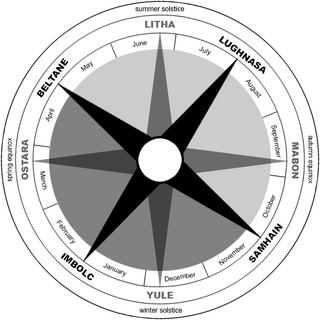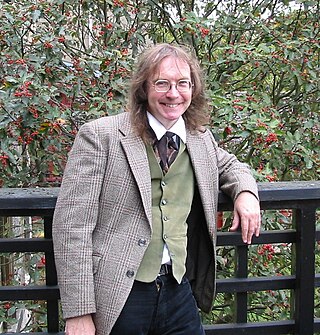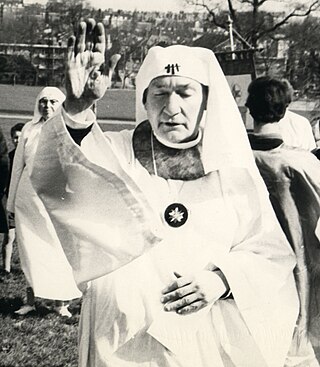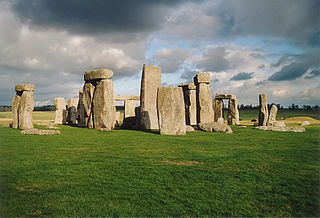
Phillip Emmons Isaac Bonewits was an American Neo-Druid who published a number of books on the subject of Neopaganism and magic. Bonewits was a public speaker, liturgist, singer and songwriter, and founder of the Neopagan organizations Ár nDraíocht Féin (ADF) and the Aquarian Anti-Defamation League.

Modern paganism, also known as contemporary paganism and neopaganism, spans a range of new religious movements variously influenced by the beliefs of pre-modern peoples across Europe, North Africa, and the Near East. Despite some common similarities, contemporary pagan movements are diverse, sharing no single set of beliefs, practices, or religious texts. Scholars of religion may study the phenomenon as a movement divided into different religions, while others study neopaganism as a decentralized religion with an array of denominations.

The Wheel of the Year is an annual cycle of seasonal festivals, observed by a range of modern pagans, marking the year's chief solar events and the midpoints between them. Modern pagan observances are based to varying degrees on folk traditions, regardless of the historical practices of world civilizations. British neopagans popularized the Wheel of the Year in the mid-20th century, combining the four solar events marked by many European peoples, with the four midpoint festivals celebrated by Insular Celtic peoples.

Ár nDraíocht Féin: A Druid Fellowship, Inc. is a non-profit religious organization based in the United States, dedicated to the study and further development of modern Druidry.

Ronald Edmund Hutton is an English historian specialising in early modern Britain, British folklore, pre-Christian religion, and modern paganism. A professor at the University of Bristol, Hutton has written over a dozen books, often appearing on British television and radio. He held a fellowship at Magdalen College, Oxford, and is a Commissioner of English Heritage.

Drawing Down the Moon: Witches, Druids, Goddess-Worshippers, and Other Pagans in America Today is a sociological study of contemporary Paganism in the United States written by the American Wiccan and journalist Margot Adler. First published in 1979 by Viking Press, it was later republished in a revised and expanded edition by Beacon Press in 1986, with third and fourth revised editions being brought out by Penguin Books in 1996 and then 2006 respectively.
Emma Restall Orr is a British animist, philosopher, poet, environmentalist, and author.

The Starwood Festival is a seven-day New Age neopagan and world music festival. It takes place every July in the United States. The Starwood Festival is a camping event which holds workshops on a variety of subjects. There are also live musical performances, rituals, bonfires, multimedia presentations and social activities. It is a clothing optional event, and skyclad attendance is common.

The Reformed Druids of North America (RDNA) is an American Neo-Druidic organization. It was formed in 1963 at Carleton College, Northfield, Minnesota, as a humorous protest against the college's required attendance of religious services. This original congregation is called the Carleton Grove, sometimes the Mother Grove. There are over 40 groves and proto-groves of the RDNA throughout the United States and Canada.

Celtic neopaganism refers to any type of modern paganism or contemporary pagan movements based on the ancient Celtic religion. One approach is Celtic Reconstructionism (CR), which emphasizes historical accuracy in reviving Celtic traditions. CR practitioners rely on historical sources and archaeology for their rituals and beliefs, including offerings to spirits and deities. Language study and preservation are essential, and daily life often incorporates ritual elements. While distinct from eclectic pagan and neopagan witchcraft traditions, there is some overlap with Neo-druidism.

Philip Peter Ross Nichols was a Cambridge academic and published poet, artist and historian, who founded the Order of Bards, Ovates and Druids in 1964. He wrote prolifically on the subjects of Druidism and Celtic mythology.
Ellen Evert Hopman is an author of both fiction and non-fiction, an herbalist, a lay homeopath, a lecturer, and a mental health counselor who lives and works in Western Massachusetts. She is the author of several books and audio tapes on Paganism and Druidry, and three novels.
Rev. Robert Lee "Skip" Ellison is a Druid priest and liturgist and an author in the fields of Druidry, Magic and divination. He was initiated into a Celtic Traditional Wiccan coven in 1982. He has been a member of the Druidic organization Ár nDraíocht Féin since 1990, serving on its Mother Grove since 1992. He served as ADF's Archdruid, and is Chief of its Magician's Guild. He was the grove Organizer for Muin Mound Grove, ADF, and became its second Senior Druid, a position he held since 1992. He has been a frequent speaker at Neo-Pagan events including the Starwood Festival, Sirius Rising, and the Wellspring Gathering. He has created a magical training system based on the trees of the forest, and has authored four books on Druidry and divination. He is also a retired industrial electrician.
Modern paganism in the United States is represented by widely different movements and organizations. The largest modern pagan religious movement is Wicca, followed by Neodruidism. Both of these religions or spiritual paths were introduced during the 1950s and 1960s from Great Britain. Germanic Neopaganism and Kemetism appeared in the US in the early 1970s. Hellenic Neopaganism appeared in the 1990s.

The Modern Pagan movement in the United Kingdom is primarily represented by Wicca and Neopagan witchcraft, Druidry, and Heathenry. 74,631 people in England, Scotland and Wales identified as either as Pagan or a member of a specific Modern Pagan group in the 2011 UK Census.
Minnesota's Twin Cities region is home to a large community of Wiccans, Witches, Druids, Heathens, and a number of Pagan organizations. Some neopagans refer to the area as "Paganistan". In the Handbook of Contemporary Paganism, Murphy Pizza characterizes the Minnesota Pagan community as "eclectic" and comprising "many different groups - Druid orders, Witch covens, legal Pagan churches, ethnic reconstructionist groups, and many more solitaries, interlopers and poly-affiliated Pagans".

Druidry, sometimes termed Druidism, is a modern spiritual or religious movement that promotes the cultivation of honorable relationships with the physical landscapes, flora, fauna, and diverse peoples of the world, as well as with nature deities, and spirits of nature and place. Theological beliefs among modern Druids are diverse; however, all modern Druids venerate the divine essence of nature.
The Dun Ailline Druid Brotherhood is a pagan organization for followers of the Celtic Neopaganism based in Spain in 2010, which supports the practice of a type of Celtic Reconstructionist Paganism called Druidism, centered on the Celtic culture of Ireland, and whose principal deities are known as the Tuatha Dé Danann. Its members consider themselves practitioners of a European native religion and they call themselves creidim, a concept of Irish origin.











